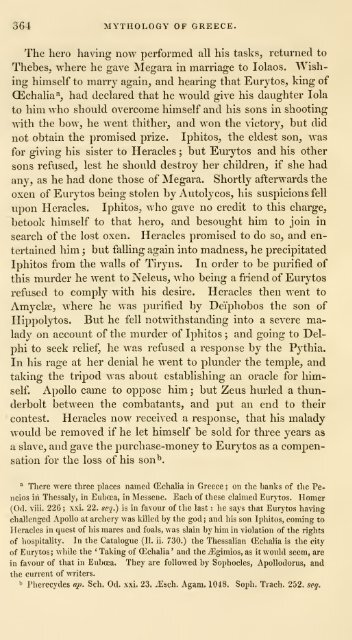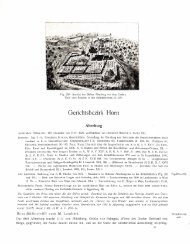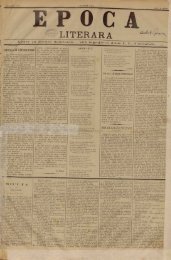- Page 2:
^Trt« of PR'A'Cf?^ Logical se^€>
- Page 6 and 7:
THE PLATES ETCHED ON STEEL, By W. H
- Page 8 and 9:
iv PREFACE. more confidence. It is
- Page 10 and 11:
VI PREFACE. The subjects of the pla
- Page 12 and 13:
Vlll PREFACE. proprietors, some of
- Page 14 and 15:
was, we find, a favourite one with
- Page 16 and 17:
X CONTENTS. CHAP. X. PALLAS-ATHENE
- Page 18 and 19:
Xll CONTENTS. CHAP. X. MYTHES OF EL
- Page 20 and 21:
Xlv PLATES. Plate V. 1. Aphrodite a
- Page 22 and 23:
XVI REFERENCES. EDITIONS REFERRED T
- Page 24 and 25:
2 MYTHOLOGY OF GREECE. its princes
- Page 26 and 27:
4 MYTHOLOGY OF GREECE. and the ligh
- Page 28 and 29:
MYTHOLOGY OF GREECE. pestilence its
- Page 30 and 31:
S MYTHOLOGY OF GREECE. rose is ascr
- Page 32 and 33:
10 MYTHOLOGY OF GREECE. honest fish
- Page 34 and 35:
12 MYTHOLOGY OF GREECE. talis Comes
- Page 36 and 37:
. 14 MYTHOLOGY OF GREECE. to its tr
- Page 38 and 39:
16 MYTHOLOGY OF GREECE. Chapter II.
- Page 40 and 41:
18 MYTHOLOGY OF GREECE. knowledge o
- Page 42 and 43:
20 MYTHOLOGY OF GREECE. mysteries c
- Page 44 and 45:
22 MYTHOLOGY OF GREECE. was the Sac
- Page 46 and 47:
24 MYTHOLOGY OF GREECE. of the Chur
- Page 48 and 49:
26 MYTHOLOGY OF GREECE. the Nature
- Page 50 and 51:
28 MYTHOLOGY OF GREECE. these were
- Page 52 and 53:
30 MYTHOLOGY OF GREECE. Violet-bed
- Page 54 and 55:
32 MYTHOLOGY OF GREECE. The Greeks
- Page 56 and 57:
34 MYTHOLOGY OF GREECE. the scenes
- Page 58 and 59:
36 MYTHOLOGY OF GREECE. In the time
- Page 60 and 61:
38 MYTHOLOGY OF GREECE. place to wh
- Page 62 and 63:
40 MYTHOLOGY OF GREECE. place of re
- Page 64 and 65:
42 MYTHOLOGY OF GREECE. and Hesiod
- Page 66 and 67:
44 MYTHOLOGY OF GREECE. Nereus had
- Page 68 and 69:
46 MYTHOLOGY OF GREECE. him. The Cy
- Page 70 and 71:
48 MYTHOLOGY OF GREECE. productive
- Page 72 and 73:
50 MYTHOLOGY OF GREECE. Chapter IV.
- Page 74 and 75:
52 MYTHOLOGY OF GREECE. This is all
- Page 76 and 77:
54 MYTHOLOGY OF GREECE. are told, i
- Page 78 and 79:
56 MYTHOLOGY OF GREECE. Neither Hom
- Page 80 and 81:
58 MYTHOLOGY OF GREECE. ance of bei
- Page 82 and 83:
60 MYTHOLOGY OF GREECE, XeXijvT]. L
- Page 84 and 85:
62 MYTHOLOGY OF GREECE. In the Home
- Page 86:
64 MYTHOLOGY OF GREECE. described a
- Page 90 and 91:
66 MYTHOLOGY OF GREECE. others said
- Page 92 and 93:
68 MYTHOLOGY OF GREECE. Kpovo? koX
- Page 94 and 95:
70 MYTHOLOGY OF GREECE. mother coul
- Page 96 and 97:
72 MYTHOLOGY OF GREECE. Chapter V.
- Page 98 and 99:
74 MYTHOLOGY OF GREECE. pour forth
- Page 100 and 101:
76 MYTHOLOGY OF GREECE. purtenances
- Page 102 and 103:
78 MYTHOLOGY OF GREECE. Chapter VI.
- Page 104 and 105:
80 MYTHOLOGY OF GREECE. tised; Zeus
- Page 106 and 107:
82 MYTHOLOGY OF GREECE. we shall gi
- Page 108 and 109:
84 MYTHOLOGY OF GREECE. lightning,
- Page 110 and 111:
86 MYTHOLOGY OF GREECE. in their ni
- Page 112 and 113:
88 MYTHOLOGY OF GREECE. with the wa
- Page 114 and 115:
90 MYTHOLOGY OF GREECE. of the most
- Page 116 and 117:
92 MYTHOLOGY OF GREECE. dead who wa
- Page 118 and 119:
94 MYTHOLOGY OF GREECE. to conceal
- Page 120:
96 MYTHOLOGY OF GREECE. Chapter VII
- Page 124 and 125:
98 MYTHOLOGY OF GREECE. Ovid a says
- Page 126 and 127:
100 MYTHOLOGY OF GREECE. bound to a
- Page 128 and 129:
102 MYTHOLOGY OF GREECE. as also we
- Page 130 and 131:
104 MYTHOLOGY OF GREECE. By Homer a
- Page 132 and 133:
106 MYTHOLOGY OF GREECE. Odyssey wh
- Page 134 and 135:
108 MYTHOLOGY OF GREECE. Hera alone
- Page 136 and 137:
110 MYTHOLOGY OF GREECE. The artist
- Page 138 and 139:
112 MYTHOLOGY OF GREECE, Chapter VI
- Page 140 and 141:
114 MYTHOLOGY OF GREECE. ascribed t
- Page 142 and 143:
11G MYTHOLOGY OF GREECE. In the Hom
- Page 144 and 145:
118 MYTHOLOGY OF GREECE. cian liter
- Page 146 and 147:
120 MYTHOLOGY OP GREECE. for hersel
- Page 148 and 149:
122 MYTHOLOGY OF GREECE. eighth yea
- Page 150 and 151:
124 MYTHOLOGY OF GREECE. Hence, to
- Page 152 and 153:
126 MYTHOLOGY OF GREECE. shines and
- Page 154:
128 MYTHOLOGY OF GREECE. be identic
- Page 158 and 159:
130 MYTHOLOGY OF GREECE. the huntre
- Page 160 and 161:
132 MYTHOLOGY OF GREECE. to drive a
- Page 162 and 163:
134 MYTHOLOGY OF GREECE. number, an
- Page 164 and 165:
136 MYTHOLOGY OF GREECE. The chief
- Page 166 and 167:
138 MYTHOLOGY OF GREECE. be looked
- Page 168 and 169:
140 MYTHOLOGY OF GREECE. sembly of
- Page 170 and 171:
142 MYTHOLOGY OF GREECE. elite a ,
- Page 172 and 173:
144 MYTHOLOGY OF GREECE. of grief f
- Page 175 and 176:
APHRODITE. 145 Apelles, vied with e
- Page 177 and 178:
EROS. 14^ Eros also for them one of
- Page 179 and 180:
EROS. 149 to expose her on a rock,
- Page 181 and 182:
EROS. 151 divinity. It is thus expl
- Page 183 and 184:
PALLAS-ATHENE. 153 Chapter X. PALLA
- Page 185 and 186:
PALLAS-ATHENE. 155 But Athensee, ch
- Page 187 and 188:
PALLAS-ATHENE. 157 The simplest and
- Page 189 and 190:
PALLAS-ATHENE. 159 dess. Here, howe
- Page 193 and 194:
HERMES. 161 Hesiod says a , that th
- Page 195 and 196:
HERMES. 1G3 The stealing of the cat
- Page 197 and 198:
HERMES. 1G5 and whose adventure wit
- Page 199 and 200:
HERMES. 167 So also, trade having o
- Page 201 and 202:
satisfied with any of these explana
- Page 203 and 204:
DEMETER. PERSEPHONE. 171 with the O
- Page 205 and 206:
DEMETER. PERSEPHONE. 173 The goddes
- Page 207 and 208:
DEMETER. PERSEPHONE. 1 75 hill/ and
- Page 209 and 210:
DEMETER. PERSEPHONE. 177 betrays th
- Page 211 and 212:
DEMETER. PERSEPHONE. 1 79 Persephon
- Page 213 and 214:
DEMETER. PERSEPHONE. 181 We cannot
- Page 215 and 216:
DEMETER. PERSEPHONE. 183 favour of
- Page 217 and 218:
MUSES. 185 Chapter XII. SISTER-GODD
- Page 219 and 220:
MUSES. 187 Parnassos, Helicon, the
- Page 221 and 222:
MUSES. 189 The most probable deriva
- Page 223 and 224:
SEASONS. 191 the works of mortal me
- Page 225 and 226:
EILEITHYIA. li>3 cles, the son of t
- Page 227 and 228:
KERES. 195 It is probable that Home
- Page 229 and 230:
FURIES. 197 respect them." This per
- Page 231 and 232:
iris. 199 sition of Zeus being her
- Page 233 and 234:
MOMOS. 201 of Hephoestos. Sleep rem
- Page 235 and 236:
PERSONIFICATIONS. 203 tune held Wea
- Page 237 and 238:
DIONYSOS. 205 Chapter XIV. DIONYSOS
- Page 239 and 240:
DIONYSOS. 207 one, that the line in
- Page 241:
Yffl
- Page 244 and 245:
210 MYTHOLOGY OF GREECE. the introd
- Page 246 and 247:
212 MYTHOLOGY OF GREECE. thence too
- Page 248 and 249:
214 MYTHOLOGY OF GREECE. Dionysos n
- Page 250:
216 MYTHOLOGY OF GREECE. Bacche ! E
- Page 254 and 255:
218 MYTHOLOGY OF GREECE. his festiv
- Page 256 and 257:
220 MYTHOLOGY OF GREECE. Chapter XV
- Page 258 and 259:
222 MYTHOLOGY OF GREECE. Affairs, a
- Page 260 and 261:
224 MYTHOLOGY OF GREECE. When she g
- Page 262 and 263:
226 MYTHOLOGY OF GREECE. "A/)Te/4t?
- Page 264 and 265:
228 MYTHOLOGY OF GREECE. be his ave
- Page 266 and 267:
230 MYTHOLOGY OF GREECE. The worshi
- Page 268:
232 MYTHOLOGY OF GREECE. The god of
- Page 272 and 273:
234 MYTHOLOGY OF GREECE. the festiv
- Page 274 and 275:
236 MYTHOLOGY OF GREECE. not—as i
- Page 276 and 277:
238 MYTHOLOGY OF GREECE. the potent
- Page 278 and 279:
240 MYTHOLOGY OF GREECE. " The scho
- Page 280 and 281:
242 MYTHOLOGY OF GREECE. course awk
- Page 282 and 283:
244 MYTHOLOGY OF GREECE. Chapter XV
- Page 284 and 285:
246 — MYTHOLOGY OF GREECE. poets
- Page 286 and 287:
248 MYTHOLOGY OF GREECE. symbol of
- Page 288 and 289:
250 MYTHOLOGY OF GREECE, Tlora/LLOL
- Page 290 and 291:
252 MYTHOLOGY OF GREECE. poets, led
- Page 292 and 293:
254 MYTHOLOGY OF GREECE. only perso
- Page 294 and 295:
256 MYTHOLOGY OF GREECE. the destru
- Page 296 and 297:
258 MYTHOLOGY OF GREECE. west are t
- Page 298 and 299:
260 MYTHOLOGY OF GREECE. stitutions
- Page 300 and 301:
262 MYTHOLOGY OF GREECE. be shown i
- Page 302 and 303:
264 MYTHOLOGY OF GREECE. joy and fe
- Page 304 and 305:
266 MYTHOLOGY OF GREECE. Sicily a .
- Page 306 and 307:
268 MYTHOLOGY OF GREECE. over all t
- Page 308 and 309:
-/O MYTHOLOGY OF GREECE. on a rock
- Page 310 and 311:
272 MYTHOLOGY OF GREECE. vine Chary
- Page 312 and 313:
274 MYTHOLOGY OF GREECE. digies ; f
- Page 314 and 315:
2/6 MYTHOLOGY OF GREECE. who appear
- Page 316 and 317:
2/8 MYTHOLOGY OF GREECE. thing of e
- Page 318 and 319:
280 MYTHOLOGY OF GREECE. we wish no
- Page 320 and 321:
282 MYTHOLOGY OF GREECE. fragrance,
- Page 322 and 323:
284 MYTHOLOGY OF GREECE. up to heav
- Page 324 and 325:
286 MYTHOLOGY OF GREECE. position,
- Page 326 and 327:
288 MYTHOLOGY OF GREECE. cult to av
- Page 328 and 329:
290 MYTHOLOGY OP GREECE. that fed o
- Page 330 and 331:
292 MYTHOLOGY OF GREECE. When Prome
- Page 332 and 333:
294 MYTHOLOGY OF GREECE. about its
- Page 334 and 335:
296 MYTHOLOGY OF GREECE. the love o
- Page 336 and 337:
298 MYTHOLOGY OF GREECE. and even u
- Page 338 and 339:
300 MYTHOLOGY OF GREECE. of that co
- Page 340 and 341:
302 MYTHOLOGY OF GREECE. Thesprotia
- Page 342 and 343:
304 MYTHOLOGY OF GREECE. to these w
- Page 344 and 345:
306 MYTHOLOGY OF GREECE. Chapter II
- Page 346 and 347:
308 MYTHOLOGY OF GREECE. nised. On
- Page 348 and 349:
310 MYTHOLOGY OF GREECE. Pelias had
- Page 350 and 351:
312 MYTHOLOGY OF GREECE. in which t
- Page 352 and 353:
314 MYTHOLOGY OF GREECE. groom a ;
- Page 354 and 355: 316 MYTHOLOGY OF GREECE. for we sho
- Page 356 and 357: 313 MYTHOLOGY OF GREECE. of Kronos
- Page 358 and 359: 320 MYTHOLOGY OF GREECE. Chapter II
- Page 360 and 361: 322 MYTHOLOGY OF GREECE. ties to th
- Page 362 and 363: 324 MYTHOLOGY OF GREECE. to resentm
- Page 364 and 365: 326 MYTHOLOGY OF GREECE. She went t
- Page 366 and 367: 328 MYTHOLOGY OF GREECE. of that ch
- Page 368 and 369: 330 MYTHOLOGY OF GREECE. Peneios, a
- Page 370 and 371: 332 MYTHOLOGY OF GREECE. rene, and
- Page 372 and 373: 334 MYTHOLOGY OF GREECE. kept up an
- Page 374 and 375: 336 MYTHOLOGY OF GREECE. lydoros th
- Page 377 and 378: ZETHOS AND AMPHION. 33/ him an equa
- Page 379 and 380: ZETHOS AND AMPIIION. 339 verdant, f
- Page 381 and 382: CEDIPUS AND IOCASTA. 341 god direct
- Page 383 and 384: TEIRESIAS. 343 curse of CEdipus on
- Page 385 and 386: MINYANS AND PHLEGYANS. 345 (or, as
- Page 387 and 388: TROPHONIOS AND AGAMEDES. 347 which
- Page 389 and 390: OTUS AND EPHIALTES. 349 Trophonios
- Page 391 and 392: HERACLES. 351 Heracles raised himse
- Page 393 and 394: HERACLES. 353 Pythia then first nam
- Page 395 and 396: HERACLES. 355 immortal one and buri
- Page 397 and 398: HERACLES. 357 and Augeas in a rage,
- Page 399 and 400: HERACLES. 359 the wages agreed on,
- Page 401 and 402: HERACLES. 361 the hills of Thrace.
- Page 403: HERACLES. 363 The twelfth and last
- Page 407 and 408: HERACLES. 36/ approach she would sh
- Page 409 and 410: HERACLES. 369 As he was passing by
- Page 411 and 412: HERACLES. 3^1 the object of the per
- Page 413 and 414: HERACLES. 37-3 meant to represent t
- Page 415 and 416: CECROPS. 375 Chapter V. MYTHES OF A
- Page 417 and 418: CECROPS. 377 peared in a work which
- Page 419 and 420: PANDION. PROCNE, PHILOMELA, AND TER
- Page 421 and 422: ERECHTHEUS. PROCRIS AND CEPHALOS. 3
- Page 423 and 424: 0RE1THYIA. 383 tryon against the Te
- Page 425 and 426: PANDION II. NISOS AND SCYLLA. iEGEU
- Page 427 and 428: . THESEUS. 387 ®?;(7€u?. Theseus
- Page 429 and 430: THESEUS. 389 found his father's cou
- Page 431 and 432: THESEUS. 391 sequence was, frequent
- Page 433 and 434: THESEUS. 393 lent affection for the
- Page 435 and 436: THESEUS. 395 appears from this, tha
- Page 437 and 438: THESEUS. 397 monsters and evil-doer
- Page 439 and 440: sisyphos. 399 Chapter VI. MYTHES OF
- Page 441 and 442: BELLEROPHONTES. 401 impressed on th
- Page 443 and 444: BELLEROPHONTES. 403 relatives named
- Page 445 and 446: INACHOS AND PHORONEUS. 405 Chapter
- Page 447 and 448: io. 407 gos warning of his projects
- Page 451 and 452: DANAOS AND .EGYPTOS. 409 they after
- Page 453 and 454: DANAOS AND .EGYPTOS. 411 world, whe
- Page 455 and 456:
PR
- Page 457 and 458:
ACRISIOS, DANAE, AND PERSEUS. 415 c
- Page 459 and 460:
ACRISIOS, DANAE, AND PERSEUS. 417 h
- Page 461 and 462:
ACRISIOS, DANAEj AND PERSEUS. 419 d
- Page 463 and 464:
AMPHITRYON AND ALCMENA. 421 came to
- Page 465 and 466:
ASCLEPIOS. 423 brilliant light, at
- Page 467 and 468:
CALLISTO AND ARCAS. 425 In Arcadia
- Page 469 and 470:
ATALANTA. 427 When we add that the
- Page 471 and 472:
TYNDAREOS AND LEDA. 429 Chapter IX.
- Page 473 and 474:
POLYDEUKES AND CASTOR. 431 Harpagos
- Page 475 and 476:
POLYDEUKES AND CASTOR. 433 That the
- Page 477 and 478:
NELEUS AND PERICLYMENOS. 435 she ex
- Page 479 and 480:
MELAMPUS AND BIAS. 437 him well, th
- Page 481 and 482:
ENDYMION. 439 of Zeus, Iamos by his
- Page 483 and 484:
CTEATOS AND EURYTOS. 441 KreaTos ic
- Page 485 and 486:
pelops. 443 many attempts at locali
- Page 487 and 488:
pelops. 445 half of the kingdom, or
- Page 489 and 490:
ATREUS AND THYESTES. 447 being, and
- Page 491 and 492:
ATREUS AND THYESTES. 449 put the ca
- Page 493 and 494:
MELANIPPOS AND COM/ETllO. J51 Chapt
- Page 495 and 496:
SELEMNOS AND ARGYRA. 453 and decisi
- Page 497 and 498:
MINOS, RHADAMANTHYS, AND SARPEDON.
- Page 499 and 500:
ARIADNE AND PH.EDRA. 45 7 dertook t
- Page 501 and 502:
GLAUCOS. 459 eating his art to Glau
- Page 503 and 504:
oriox. 4G1 ^Eacos. The righteous so
- Page 505 and 506:
orion. 463 the son of Dionysos and
- Page 507 and 508:
PLEIADES AND IIYADES. 465 The well-
- Page 509 and 510:
PLEIADES AND HYADES. 467 the same p
- Page 511 and 512:
THE ARGONAUTIC EXPEDITION. 469 soot
- Page 513 and 514:
THE ARGONAUTIC EXPEDITION. 47l him,
- Page 515 and 516:
THE ARGONAUTIC EXPEDITION. 473 But
- Page 517 and 518:
THE ARGONAUTIC EXPEDITION. 475 all
- Page 519 and 520:
THE ARGONAUTIC EXPEDITION. 477 they
- Page 521 and 522:
: THE THEBAN WARS. 4/9 the rights o
- Page 523 and 524:
THE THEBAN WARS. 481 daughter Arsin
- Page 525 and 526:
THE TROJAN WAR. 483 Ta Tpcoi/ca. Th
- Page 527 and 528:
THE TROJAN WAR. 485 on Ida to peris
- Page 529 and 530:
medes a . THE TROJAN WAR. 487 Telep
- Page 531 and 532:
THE TROJAN WAR. 489 walls of Troy.
- Page 533 and 534:
THE TROJAN WAR. THE RETURNS. 491 Su
- Page 535 and 536:
THE RETURNS. 493 overtook at Lesbos
- Page 537 and 538:
THE RETURNS. 495 sacrifice to the N
- Page 539 and 540:
THE RETURNS. 4D? Ave think was the
- Page 541:
THE RETURNS. 499 mythologic wand th
- Page 544 and 545:
502 MYTHOLOGY OF ITALY. was varied,
- Page 546 and 547:
504 MYTHOLOGY OF ITALY. nomena. The
- Page 548 and 549:
506 MYTHOLOGY OF ITALY. The Sabelli
- Page 550 and 551:
508 MYTHOLOGY OF ITALY. that such w
- Page 552 and 553:
510 MYTHOLOGY OF ITALY. rural gods
- Page 554:
512 MYTHOLOGY OF ITALY. As the patr
- Page 558 and 559:
514 MYTHOLOGY OF ITALY. have been u
- Page 560 and 561:
516 MYTHOLOGY OF ITALY. There was a
- Page 562 and 563:
518 MYTHOLOGY OF ITALY. Neptunus. N
- Page 564 and 565:
520 MYTHOLOGY OF ITALY. manner. She
- Page 566 and 567:
522 MYTHOLOGY OF ITALY. position of
- Page 568 and 569:
524 MYTHOLOGY OF ITALY. The Saturna
- Page 570 and 571:
526 MYTHOLOGY OF ITALY. the son of
- Page 572 and 573:
528 MYTHOLOGY OF ITALY. Chapter III
- Page 574 and 575:
530 MYTHOLOGY OF ITALY. Sancus. San
- Page 576 and 577:
532 MYTHOLOGY OF ITALY. ing coals o
- Page 578 and 579:
534 MYTHOLOGY OF ITALY. the commenc
- Page 580 and 581:
536 MYTHOLOGY OF ITALY. When Tarqui
- Page 582 and 583:
538 MYTHOLOGY OF ITALY. honour the
- Page 584 and 585:
540 MYTHOLOGY OF ITALY. tuous chara
- Page 586 and 587:
542 MYTHOLOGY OF ITALY. The Italian
- Page 588 and 589:
544 MYTHOLOGY OF ITALY. body, a Lem
- Page 590 and 591:
546 MYTHOLOGY OF ITALY. blance ; an
- Page 592 and 593:
548 APPENDIX. B. Page 35. The ^Ethi
- Page 594 and 595:
550 APPENDIX. AlOprjyevijs, the epi
- Page 596 and 597:
552 APPENDIX. usage in the prose wr
- Page 598 and 599:
554 APPENDIX. 'Eff7repia, when conf
- Page 600 and 601:
556 APPENDIX. ADDITIONS. Page 32.
- Page 602 and 603:
558 XDEX. Arge, 133, 134 Argeiphont
- Page 604 and 605:
560 Gorgons, 2.52—254, 415 Gorgop
- Page 606 and 607:
562 INDEX. Orthos, 359 Ortygia, 278
- Page 608 and 609:
564 INDEX. Abode of the dead, 90, 9
- Page 610 and 611:
WORKS BY THE SAME AUTHOR. V. QUESTI
- Page 612:
WORKS BY THE SAME AUTHOR. "Our auth

















